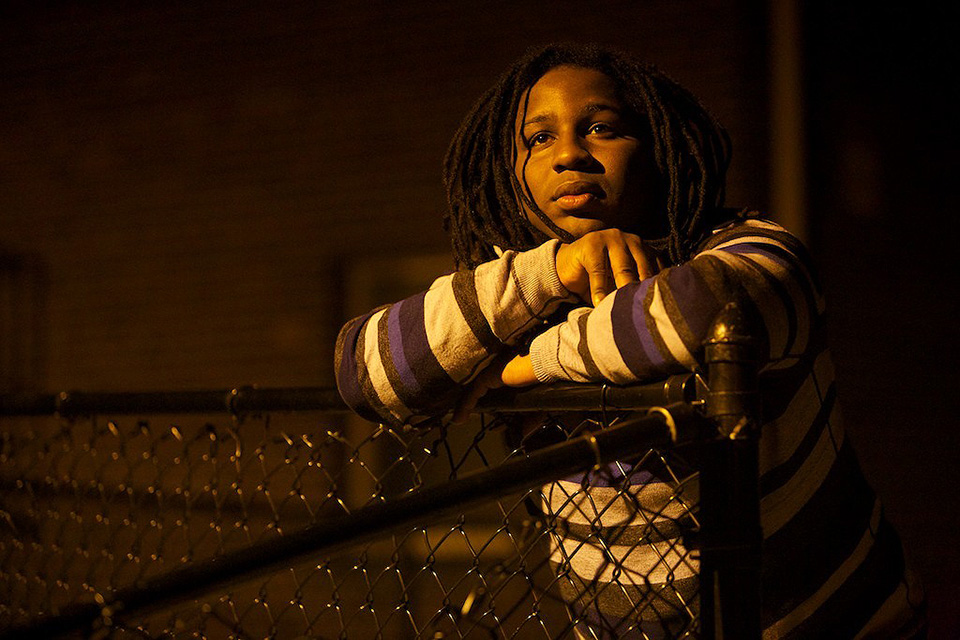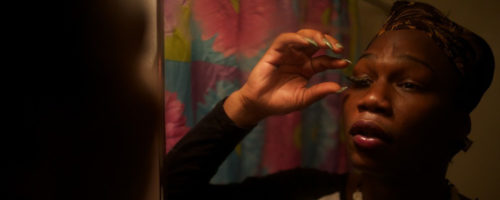Letting documentary filmmakers in on some of the most personal and intimate moments of his life did not come easy for Trayvon Warren. He wasn’t sure how it would impact his life. But with a little encouragement from his mom, the Washington, D.C.-native agreed to be one of the central subjects in the film Check It, which documents the story of a 200-plus youth movement of the same name, that Warren is a founding member of. “I just want people to learn from it,” he says.
The Check It is a group of Black gay and transgender youth, who first banded together in 2007 to stand up to constant bullying and violence against them. Deemed a ‘gang’ (a term the group rejects) by law enforcement, and viewed as ‘trouble’ by the community at large, The Check It was a safe space for many young people living on the city’s margins. As Warren points out early in the film, the group had each other’s backs when no one else seemed to. It was a family.
The film, which has been screening in various North American cities and festivals this past year, offers a look inside The Check It through four of its founding members — Warren, (known as Tray), Skittles, Day Day and Alton. Filmmakers Dana Flor and Toby Oppenheimer, along with their crew, spent long days — sometimes from 10 a.m. to 5 a.m. the next morning — documenting the journey of The Check It as members worked with three mentors to transition from life on the street to places they’d rather be, such as fashion runways and boxing rings. Warren says his hope is that by watching the film, new generations of youth like them who are facing insurmountable challenges like systemic racism, poverty, homophobia and transphobia will learn from their journey. “Everybody don’t have to get violent and be violent to protect themselves, [there] is another way out and [there] is a different way you can handle the situations and do different things without being violent with it,” he says.

For him, he found alternatives to violence after meeting Ronald Moten, who, after serving time in prison, returns to his community, eager to make a difference. He is one of the mentors central in The Check It members’ lives and in the film. Warren emphasizes that just one caring adult, like Moten, who listens — truly listens — to a young person can make a huge difference. “You have to have support,” Warren says. “A lot of young, and not just LGBTQ, people, don’t have support at home. It may not be in their household; it may just be in the streets . . . They just need a conversation; they just need somebody to talk to.”
As the film progresses it becomes clear the impact that these adults have on the lives of The Check It members. Beyond Moten, Skittles, who has a passion and talent for boxing, is paired up with Duke, a trainer who runs a local boxing gym and Tray, Alton and Day Day are accepted into a fashion apprenticeship program. Under the mentorship of program lead Jarmal Harris, they work with other youth to plan and execute a high-production fashion show.
Check It scenes range from deeply personal and intimate moments — a highly emotional visit between Day Day and his mother at a halfway house or an upset Tray sitting on a curbside trying to report a sexual assault and being met with utter disregard — to scenes ripe with conflict between Check It members and others. Personal accounts of everything from addiction and abuse to prostitution ensue. However, there is a noticeable gap, poignantly articulated by CBC Arts columnist and host, Amanda Parris. There is little discussion of the deep-rooted, complex issues such as systemic discrimination and poverty that are at play within each young person’s life.
“It’s important for people to understand that hurt people, hurt people and healed people, heal people.”
Still, both Moten and Warren say they are pleased with the final result. “I think that the biggest thing was this is a story that people needed to know about marginalized young people that a city had forgotten about right in the nation’s capital, where a lot of stuff was going on blocks away from the White House,” explains Moten. He mentions that because of the filmmakers’ track record creating The Nine Lives of Marion Berry, a documentary centred on former D.C. mayor Marion Berry, Moten trusted them to tell The Check It’s story.
What he’s most excited about is that in the time since filming began, The Check It has evolved into Check It Enterprises, a social enterprise building off some of the members’ passion for fashion with merchandise like T-shirts available for purchase. Not just that, but many of the group leaders, like Warren, are stepping into peer mentor roles for pre-teens and teens now growing up in the area. Moten calls them change agents in the community.
“It’s important for people to understand that hurt people, hurt people and healed people, heal people,” he says. “With the children in Check It, that’s what it was, they were bullied and they would fight back, but sometimes they would end up being people who would be aggressive . . . [As adults] the best thing that we can do is just absorb their pain, so they can heal, and then give them an outlet to go back and heal other people so we can have peace and empowerment to continue.”




Comments are closed.